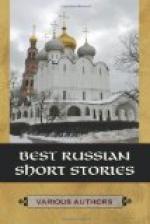The very first work of importance by Turgenev, A Sportsman’s Sketches, dealt with the question of serfdom, and it wielded tremendous influence in bringing about its abolition. Almost every succeeding book of his, from Rudin through Fathers and Sons to Virgin Soil, presented vivid pictures of contemporary Russian society, with its problems, the clash of ideas between the old and the new generations, and the struggles, the aspirations and the thoughts that engrossed the advanced youth of Russia; so that his collected works form a remarkable literary record of the successive movements of Russian society in a period of preparation, fraught with epochal significance, which culminated in the overthrow of Czarism and the inauguration of a new and true democracy, marking the beginning, perhaps, of a radical transformation the world over.
“The greatest writer of Russia.” That is Turgenev’s estimate of Tolstoy. “A second Shakespeare!” was Flaubert’s enthusiastic outburst. The Frenchman’s comparison is not wholly illuminating. The one point of resemblance between the two authors is simply in the tremendous magnitude of their genius. Each is a Colossus. Each creates a whole world of characters, from kings and princes and ladies to servants and maids and peasants. But how vastly divergent the angle of approach! Anna Karenina may have all the subtle womanly charm of an Olivia or a Portia, but how different her trials. Shakespeare could not have treated Anna’s problems at all. Anna could not have appeared in his pages except as a sinning Gertrude, the mother of Hamlet. Shakespeare had all the prejudices of his age. He accepted the world as it is with its absurd moralities, its conventions and institutions and social classes. A gravedigger is naturally inferior to a lord, and if he is to be presented at all, he must come on as a clown. The people are always a mob, the rabble. Tolstoy, is the revolutionist, the iconoclast. He has the completest independence of mind. He utterly refuses to accept established opinions just because they are established. He probes into the right and wrong of things. His is a broad, generous universal democracy, his is a comprehensive sympathy, his an absolute incapacity to evaluate human beings according to station, rank or profession, or any standard but that of spiritual worth. In all this he was a complete contrast to Shakespeare. Each of the two men was like a creature of a higher world, possessed of supernatural endowments. Their omniscience of all things human, their insight into the hiddenmost springs of men’s actions appear miraculous. But Shakespeare makes the impression of detachment from his works. The works do not reveal the man; while in Tolstoy the greatness of the man blends with the greatness of the genius. Tolstoy was no mere oracle uttering profundities he wot not of. As the social, religious and moral tracts that he wrote in the latter period of his life are instinct with a literary beauty of which he never could divest himself, and which gave an artistic value even to his sermons, so his earlier novels show a profound concern for the welfare of society, a broad, humanitarian spirit, a bigness of soul that included prince and pauper alike.




